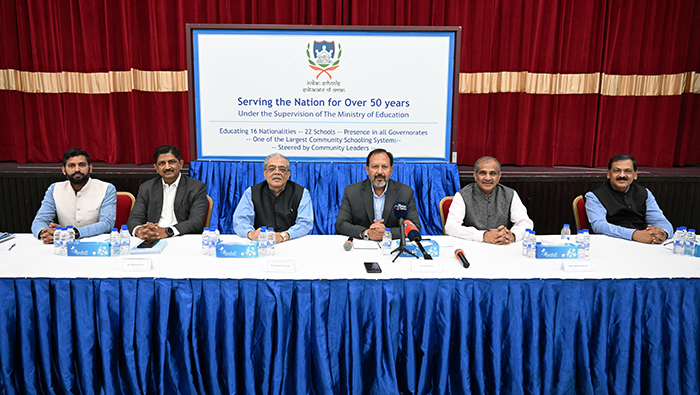
Muscat: The Chairman of the Board of Directors, Indian Schools Oman, Syed Ahmad Salman, unveiled a series of transformative initiatives aimed at aligning the Indian schooling system in Oman with emerging global educational trends, in a press briefing held on Saturday.
These measures reflect a visionary enhancement in curriculum and infrastructure, designed to equip students and educators with future-ready skills and resources.
As part of its strategic agenda for the 2025–27 term, the board has approved the introduction of Financial Literacy and AI (Artificial Intelligence) as part of the learning framework for students from Class 5 onwards.
A comprehensive Financial Literacy programme is being rolled out across all Indian Schools in Oman from this week onwards. This initiative is designed to foster early awareness of financial principles, empowering students with the knowledge to manage personal and household finances effectively while sparking interest in finance as a professional pathway.
The AI curriculum, which will be implemented immediately after the summer break, aims to provide students with foundational exposure to machine learning, algorithms, and responsible use of AI tools—setting a precedent for technology-led education within the region.
Salman stated. “The integration of AI into the curriculum marks a significant milestone. Our objective is not only to familiarise students with emerging technologies but also to nurture critical thinking, innovation, and digital fluency from a young age.” The Chairman, further emphasised the board’s renewed commitment to infrastructure development across schools.
An infrastructural audit is currently underway to ensure equity in access to facilities for all students, regardless of location.
Major projects are in progress at Indian School Muscat (Jibroo campus), Indian School Darsait, Indian School Seeb, Indian School Sur, and Indian School Salalah, with more schools lined up for development.
In response to growing community demand, the board has also initiated feasibility studies to establish new Indian Schools in Barka and Sinaw, reaffirming its goal of expanding access to quality education in under-served regions.
Recognising that the quality of education is intrinsically linked to the capabilities of its educators, the Board has commenced a Training Needs Assessment survey among teaching staff to identify key areas for Professional Development (PD).
A structured PD roadmap will be formulated based on these insights to enhance instructional quality across the network.
In a first-of-its-kind move, this nascently formed board has also consented for the establishment of a Sports Academy under the supervision of the Sports Committee.
The academy will nurture and train students with sporting potential and ambition, offering them structured pathways to pursue careers in sports and allied fields.
Salman concluded by reiterating the board’s student-centric vision: “Every initiative taken by this board is directed towards the holistic development of our students—preparing them as global citizens, critical thinkers, and confident individuals in a rapidly evolving world.”
He called upon the parent community and all stakeholders to extend their wholehearted support in embracing and advancing these progressive changes within the Indian Schooling ecosystem in Oman.